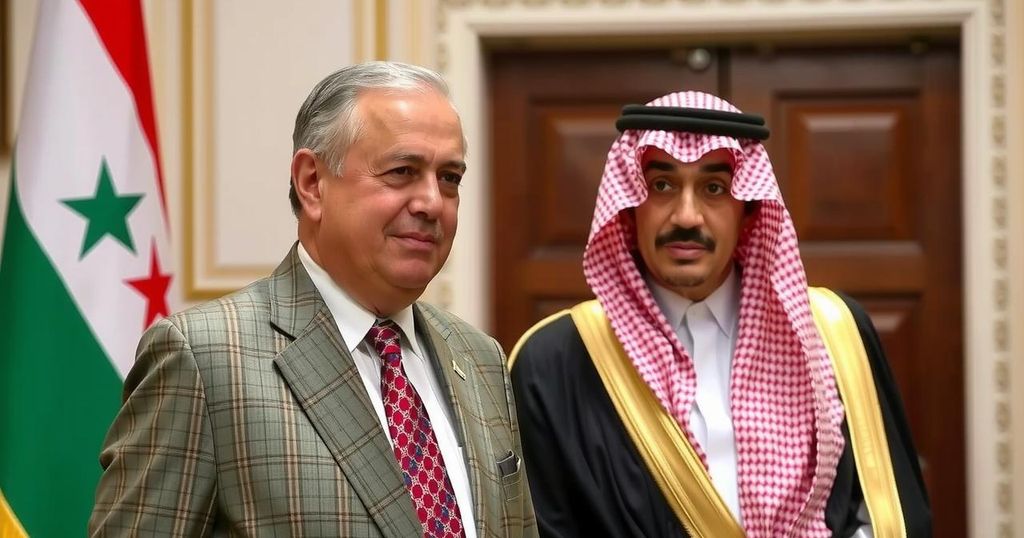Syria’s Foreign Minister Asaad Al Shibani traveled to Saudi Arabia, marking the first visit of the new Syrian government post-Bashar Al Assad’s ousting. The delegation aims to strengthen Syrian-Saudi relations. Regional governments, including Egypt and Oman, have expressed support, highlighting investment opportunities in Syria amid its recovery from civil war devastation.
On Wednesday, Syria’s Foreign Minister Asaad Al Shibani embarked on an official visit to Saudi Arabia, marking the inaugural foreign trip by officials from the newly established Syrian government following the ousting of former President Bashar Al Assad last month. Accompanied by Defence Minister Murhaf Abu Qasra and Anas Khattab, head of the General Intelligence Service, Mr. Al Shibani expressed hope that this visit would herald a new era in Syrian-Saudi relations, aligning with their historically intertwined past.
Regional countries and Western nations have been engaging with the new Syrian leadership led by Ahmad Al Shara of Hayat Tahrir Al Sham, since the group’s previous rebel offensive resulted in Mr. Al Assad’s removal on December 8. Support offers have come from the foreign ministers of Egypt and Oman during recent communications with Mr. Al Shibani, while the Charge d’Affaires of the EU Mission had discussions with him in Damascus.
State media from Syria reported that Mr. Al Shibani’s trip to Saudi Arabia was made at the invitation of Saudi Foreign Minister Prince Faisal bin Farhan. Upon arrival at Riyadh airport, the delegation was welcomed by the Saudi Vice Minister of Foreign Affairs, Waleed bin Abdulkarim El Khereiji. In an earlier interview, Mr. Al Shara acknowledged the significant role Saudi Arabia would play in shaping Syria’s future, highlighting potential investment opportunities for neighboring countries.
The Syrian economy and infrastructure have suffered extensively due to the prolonged civil war commencing in 2011, triggered by violent responses to pro-democracy protests. Saudi Arabia, having severed ties with the Assad regime in 2012, reinstated its relations in the previous year and facilitated Syria’s reentry into the Arab League, restoring its regional standing. Additionally, Gulf nations have sought guarantees from the Assad government regarding the cessation of Captagon drug trafficking from Syria—a major illicit export during the later years of his administration, involving billions in trade value.
The backdrop to Syria’s recent diplomatic engagement with Saudi Arabia involves the significant political changes following the overthrow of Bashar Al Assad, who led Syria amidst a catastrophic civil war lasting over a decade. The emergence of new leadership, particularly under the group Hayat Tahrir Al Sham, represents a shift in Syria’s governance and international relations. Saudi Arabia’s decision to rekindle ties stems from broader political and economic interests, especially after reassessing its approach towards Syria post-Assad. The historical context of Syrian-Saudi relations illustrates a complex sequence of shifting allegiances and regional power dynamics, particularly in light of the ongoing repercussions from the civil conflict and its impact on regional stability.
In conclusion, the historic visit of Syria’s Foreign Minister Asaad Al Shibani to Saudi Arabia symbolizes a pivotal moment in the evolving geopolitical landscape of the region. The engagement indicates a willingness to foster improved relations, not only between Syria and Saudi Arabia but also among wider Arab nations. As the new Syrian government seeks to stabilize and rebuild the country, regional support and potential investment from neighboring states will be crucial, particularly in confronting the repercussions of the long-standing conflict.
Original Source: www.thenationalnews.com






